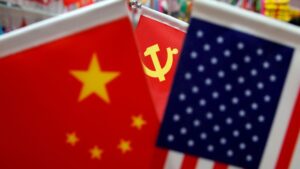Navigating the Future of U.S.-China Financial Relations: Insights from Extreme Investor Network
In recent weeks, the U.S.-China financial landscape has become a focal point of global economic discourse, especially with the impending policies of President-elect Donald Trump that could reshape trade dynamics. At Extreme Investor Network, we’re committed to providing our readers with unique insights and in-depth analyses that go beyond ordinary headlines. Here’s a closer look at the recent interactions between Chinese Vice Premier He Lifeng and prominent U.S. finance executives, and what it all means for investors and markets.
Key Meetings and Strategic Alliances
Chinese Vice Premier He Lifeng, an influential figure in the ruling Communist Party’s economic advisory committee, has actively engaged with several top U.S. financial executives. Notably, He met with Larry Fink, Chairman and CEO of BlackRock, and John E. Waldron, President and COO of Goldman Sachs, just days apart in early December. Earlier in November, he also conversed with Citigroup’s CEO Jane Fraser, highlighting an urgent effort to build cooperative relationships with key U.S. financial powerhouses.
According to Peter Alexander, founder of Shanghai-based consulting firm Z-Ben Advisors, this outreach signals China’s desire to strengthen ties with those now ascending in power in Washington, especially considering Trump’s increasing protectionist stance. The emphasis on “back channeling” is typical of China’s strategic approach to diplomacy, one that aims to create robust lines of communication, even in tumultuous times.
Wall Street’s New Faces and Market Reactions
As Trump’s Cabinet begins to take shape, it includes several billionaires with finance-heavy backgrounds. Figures such as hedge fund manager Scott Bessent and Cantor Fitzgerald CEO Howard Lutnick are likely to play crucial roles in shaping economic policies. Experts suggest that these individuals may act as moderating influences on the more aggressive trade policies anticipated from the Trump administration.
Clark Packard, a research fellow at the Cato Institute, pointed out the concern on Wall Street regarding potential market reactions to stiff tariffs. The health of the stock market—even in the face of political changes—could become a key factor that deters overly aggressive policies. With U.S. stocks nearing 20% growth for two consecutive years, investors are understandably cautious about market fluctuations driven by political tensions.
Strategic Posturing Amid Uncertainty
Amidst these meetings and financial maneuverings, one key takeaway is that Beijing is keeping its options open while preparing for potential trade conflicts. As Zongyuan Zoe Liu, senior fellow for China studies at the Council on Foreign Relations, indicates, actions such as hosting meetings with Wall Street executives and implementing export controls are indicative of China’s efforts to brace for the worst.
Moreover, Chinese state media has portrayed these engagements as a signal of Beijing’s openness to further foreign institutional investment, aiming to attract enduring capital inflows that can bolster the domestic market. These efforts underline the interdependence of U.S. and Chinese financial markets, which have become "arguably the most dynamic and interconnected aspect" of their bilateral relationship in the past two decades, as explained by Winston Ma, adjunct professor at NYU School of Law.
The Road Ahead: Mutual Prosperity or Destruction?
As we venture deeper into this complex economic landscape, the trajectory of U.S.-China relations remains uncertain. Increasing tariffs could lead to tensions that affect bilateral trade and investment strategies. However, should relations remain constructive, we may witness what Ma refers to as "mutual assured prosperity." Conversely, a rise in protectionist policies could usher in an era of "mutual assured destruction," further complicating global economic stability.
At Extreme Investor Network, our commitment is to keep you informed about these intricate shifts in the financial world. We strive to provide you with the insights needed to navigate your investment strategies prudently while keeping your focus on long-term growth and stability in an ever-changing market.
Conclusion
The interplay between U.S. finance executives and Chinese officials highlights a crucial phase in the global financial landscape. As we continue to monitor these developments, we encourage our readers to stay engaged with our expert analyses and updates. Together we can weather the storms of financial uncertainty and emerge ahead in the investment game. Join us as we explore the opportunities and challenges this new chapter presents.

